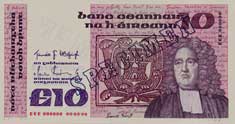
![]()
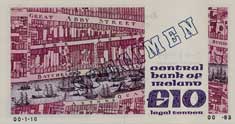
The Central Bank of Ireland Archive, which were opened to public access in 2017, has provided new source material on the designs of the Irish Series B banknotes. Some of the content of this article draws on information from the archive. This is referenced as CBIAR in the text.
The 'Swift' Irish 10 pound note theme is one of architecture and learning in 18th century Ireland.
The Central Bank of Ireland Series B banknotes are generally referred to as the 'Celtic Design Series'. The notes are printed entirely in Irish on the face using a 'Celtic' style typeface.
The Swift 10 pound note was launched at a press briefing at the Central Bank of Ireland Currency Centre in Sandyford, Dublin on 9 August 1978.
The new Irish 10 Pound note entered circulation on 14 August 1978, two and a half months after its first date of issue, 1 June 1978. It was the third denomination of the Series B banknotes to enter circulation, after the £5 note in 1976, and the £1 note in 1977.
The first date of issue of the Series B Irish 10 note is 01.06.78, and this date is the earliest dated banknote to bear the signature of Thomás F O'Cofaigh as Secretary of the Department of Finance, who was appointed in October 1978.
![]()
![]()
![]()
The intricate design details on the denomination in numerals on the face (above) and reverse (below) of the Swift Irish 10 Pound note
The face and reverse of the Swift ten pound note uses a typeface designed by Michael Biggs, one of the Servicon team, in 1953. It is a modern typeface based on Unical.
All the text on the face of the new Irish 10 pound note is in Irish. 'Banc Ceannais na h-Éireann' (Central Bank of Ireland) 'Nóta dlíthairgthe deich bpunt' (Legal tender note ten pounds). Below the watermark field are the signatures and the titles of the signatories: 'an gobharnóir' (governor) and 'rúnaí na roinne airgeadais' (secretary of the department of finance).
The text on the reverse is in English only, 'Central Bank of Ireland', '£10', 'Legal Tender' in the unprinted field below the watermark.
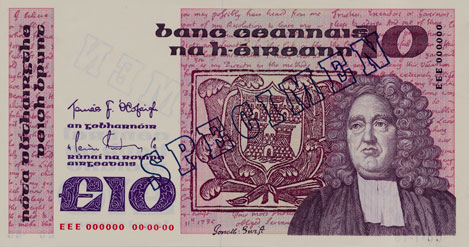
![]()
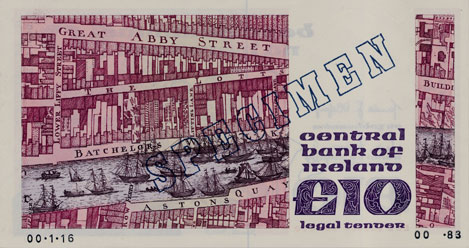
To the right on thhe face of the note is a prominent portrait of Dean Jonathan Swift (1667-1745) [2.], based on a portrait by Charles Jervas [3.], which is held by the National Portrait Gallery, London.
On the banknote, Swift faces in the opposite direction to that in the original portrait.
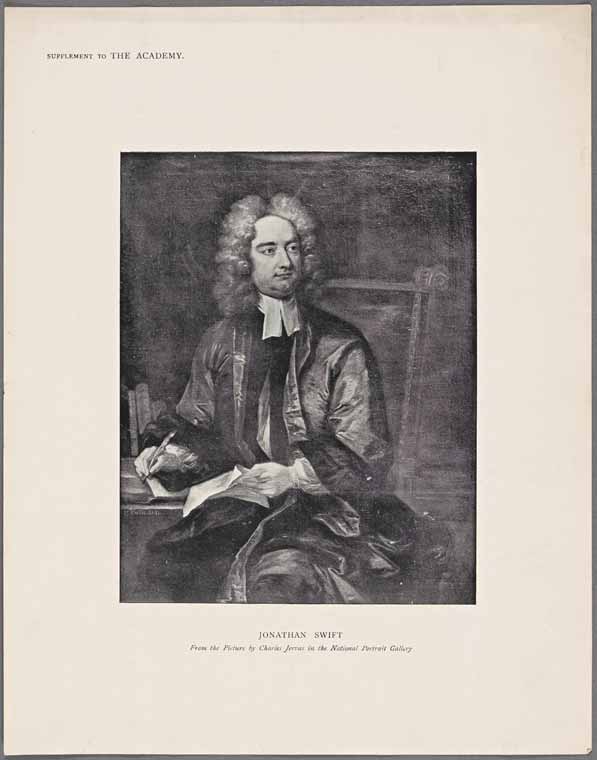
A print ca1910 of the original protrait of Jonathan Swift on which the portrait on the Series B Irish 10 pound note is based [3. Source: The Miriam and Ira D. Wallach Division of Art, Prints and Photographs: Print Collection, The New York Public Library.]
The symbol in the centre of the Swift 10 pound note is the three towers arms of Dublin, the 'Aras of Dublin' [4.], based on its depiction on a resolution of Dublin city council dating from 1713.
In the background is a letter, dated 11 April, 1735, from Dean Swift to Eaton Stannard (1685-1755), Recorder of the city of Dublin, and a prominent politician and lawyer [5.].
The symbol in the centre of the face of the Swift Irish 10 Pound note
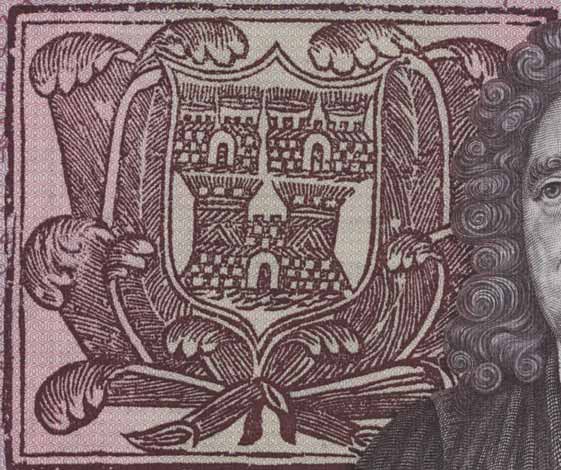
The Symbol in the centre of the Swift Ten Pound note, the three castles 'Aras of Dublin'
The reverse of the Dean Swift Irish 10 pound note depicts a section of a map of Dublin, based on a map of the city by John Rocque, 'An exact survey of the city and suburbs of Dublin; in which is express'd the ground plot of all publick buildings, dwelling houses, ware houses, stables, courts, yards &c', first published in 1756. [6.]. It was one of the first accurate maps of the city. The area shown on the banknote is of the city centre and the quays on the river Liffey.
The reproduction of the map on the banknote has some slight differences, the most obvious being the location of the label of Astons Quay, where the letters of the word 'Quay' have been relocated so that they are in the visible area of the map as represented on the note.
The portion of the map used is rotated 20 degrees to the right on the banknote.
A scan of the actual map of Dublin which was used as a basis for the design of the reverse of the Swift 10 pound note is freely available to view online at much higher resolution [7.]. Map source: curiosity.lib.harvard.edu. Reproduced under Creative Commons Attribution 4.0 International License.
The Irish Jonathan Swift 10 Pound note was a complete design change from the old 'Lady Lavery' Irish 10 Pound note which it replaced. The colour was changed from being predominantly blue on the old Irish 10 pound note to a purple on the new Series B note. The 'Lavery' Series A design banknotes had been in circulation for over 50 years, having been first issued in 1928.
The Series B Irish 10 notes were considerably smaller in size than the notes they replaced. The overall dimensions of Irish pound notes tended to vary in by a millimetre or so. Dimensions below are from measurements of actual notes.
Series A, Lady Lavery Irish 10 Pound Note, 191 x 108 mm.
Series B, Swift Irish Ten Pound Note, 164 x 86 mm.
Below are illustrated the last date of Series A £10 notes, and the first date of Series B £10 notes.
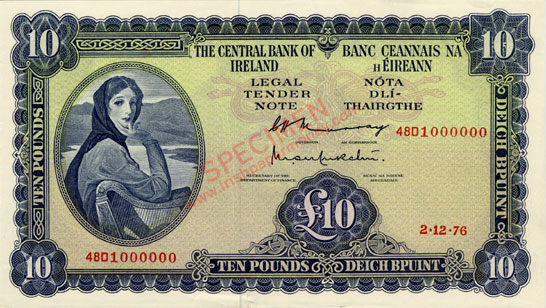
![]()
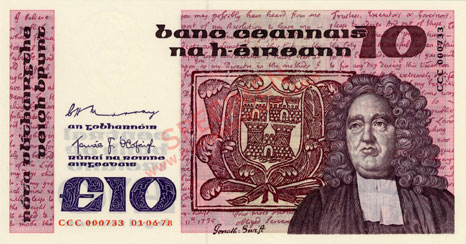
The Series B banknotes were also known as the 'Irish Punt series', more commonly abroad than in Ireland, likely a reflection of their being printed entirely in Irish on the face of each denomination. The Swift 'Ten Punt' was a common denomination which was distributed in large quantities from ATM machines during the 1990s. Examples of the note are easy to obtain in AU grade.
True UNC grade Swift Irish 10 Pound notes, with four sharp corners (Grade 67 with quality mark, or higher) are less common, their availability depends on collectors retaining them during their era of issue. Ten pounds was a significant amount of money to hold onto.
Series B Irish 10 pound notes are printed offset in three colours on the face and two colours on the reverse, with three intaglio printings on each side on watermarked paper manufactured in Switzerland.
The face and reverse printings are primarily purple in colour, with some blue underprint.
Serial numbers are printed in red and black ink. All notes bear a date of issue in red ink which is tied to a specific group of prefixes.
A metallic security thread is embedded in the paper to the right of center which can easily be viewed when the note is held up to the light. This metallic thread was a standard security feature used in all of the Irish Series B banknotes.
The central section of the face and reverse of the Series B £10 note fluoresces under UV light. The intensity of the fluorescence varies randomly throughout the years of the issue.
The Swift Irish 10 Pound note was the third denomination of Series B banknotes to enter circulation. The note circulated for approximately 14 years. The £10 note was withdrawn from circulation in 1993, the final date being 15.04.92.
It was replaced by the much smaller Series C £10 note design, issued in 1993.
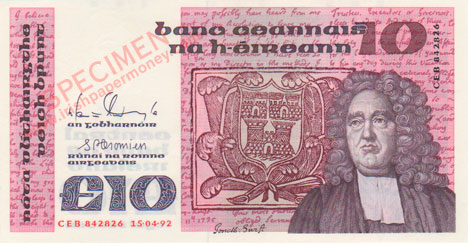
![]()
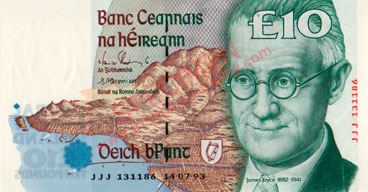
E145. Type 17: Signatures: C. H. Murray, Tomás F. Ó Cofaigh. 13 Dates, 7 replacements, CCC. 01.06.78–28.10.81.
E146. Type 18: Signatures: Tomás F. Ó Cofaigh, Maurice Doyle. 9 Dates, 4 replacements, HHH. 25.02.83-09.02.87.
E147. Type 19: Signatures: Maurice Doyle, S. P. Cromien. 13 Dates, 4 replacements, HHH. 22.12.87-15.04.92.

Ireland, Swift Ten Pounds. Murray, Ó Cofaigh signatures, 1978 - 1981

Ireland, Swift Iries 10 Pound note. Ó Cofaigh, Doyle signatures, 1983 - 1987
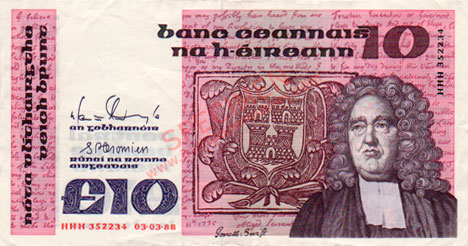
Ireland, Swift Irish 10 Pounds. Doyle, Cromien signatures, 1987 - 1992
There were 35 dates for the Series B Irish 10 pound note. The first date was 01.06.78, and the final date was 14.02.92.
The Swift ten pound notes are common. It is quite easy to inexpensively collect all the dates of issue in circulated condition. An image of each of the 35 dates can be viewed on the Series B Ten Pound Note Dates page.
Several dates of the Swift £10 note are recorded with replacement note prefixes CCC and HHH. All known dates are marked on the Series B Irish 10 Pound Notes Dates page, along with an image of an example of each £10 replacement note.
References [Last retrieved 04.08.24]
1. Central Bank of Ireland Archives, Dublin. Referred to as CBIAR in the text. [Accessed 24 May 2018].
2. Background biography and information on Jonathan Swift. <https://www.dib.ie/biography/swift-jonathan-a8415>
<https://www.britannica.com/biography/Jonathan-Swift>
3. Print of the Portrait of Dean Jonathan Swift by Charles Jervas. Source: The Miriam and Ira D. Wallach Division of Art, Prints and Photographs: Print Collection, The New York Public Library. (1900 - 1910). Jonathan Swift. From the picture by Charles Jervas in the National Portrait Gallery Retrieved from https://digitalcollections.nypl.org/items/c64ed6e0-4ece-0130-b36e-58d385a7b928
4. Dublin city 'Three Castles' symbol. <https://www.dublincity.ie/council/your-city-council/lord-mayor-dublin/history/dublin-city-coat-arms>
<https://www.fourcourtspress.ie/books/2016/the-three-castles-of-dublin/>
5. Eaton Stannard. <https://catalogue.nli.ie/Record/vtls000314288>
6. A map of Dublin city by John Rocque, first published in 1756. <https://virtualtreasury.ie/item?isadgReferenceCode=LBC%20Rocque%2F1>
7. A print of John Rocque's 1756 map of Dublin city. <https://curiosity.lib.harvard.edu/scanned-maps/catalog/44-990114744870203941>
1 Pound Ploughman
5 Pounds Ploughman
10 Pounds Ploughman
20 Pounds Ploughman
50 Pounds Ploughman
100 Pounds Ploughman
Irish Ten Shilling Notes
1 Pound Note Lady Lavery
5 Pounds Lady Lavery
10 Pounds Lady Lavery
20 Pounds Lady Lavery
50 Pounds Lady Lavery
100 Pounds Lady Lavery
1 Pound Note, Queen Medb
5 Pound Note, John Scotus Eriugena
10 Pound Note, Jonathan Swift
20 Pound Note, W. B. Yeats
50 Pound Note, Turlough O'Carolan
100 Pound Note, Grace O'Malley
5 Pound Note, Sister Catherine McAuley
10 Pound Note, James Joyce
20 Pound Note, Daniel O'Connell
50 Pound Note, Douglas Hyde
100 Pound Note, Charles Stewart Parnell
Northen Ireland Polymer notes
Bank of Ireland Polymer Notes
Danske Bank Polymer Notes
Ulster Bank Polymer Notes
Special Sections and Articles
The Transition of Irish Currency, Irish banknotes 1918–1928
The Partition of Irish Currency, Irish banknotes 1928–1930
Banknote Design Evolution 1824 to 1916
Irish Three Pound Notes
Contemporary Forgeries of Early Irish Banknotes, ca1800-1930
Limerick Soviet Notes
Irish World War 2 Banknote Issues
Low Number Irish Banknotes
Irish Joint Stock Banks of Note Issue from 1783
Irish Legal Tender Note Specimens
Ploughman Scan Survey (PSS)
![]() Stable version. Last update 04.08.24.
Stable version. Last update 04.08.24.